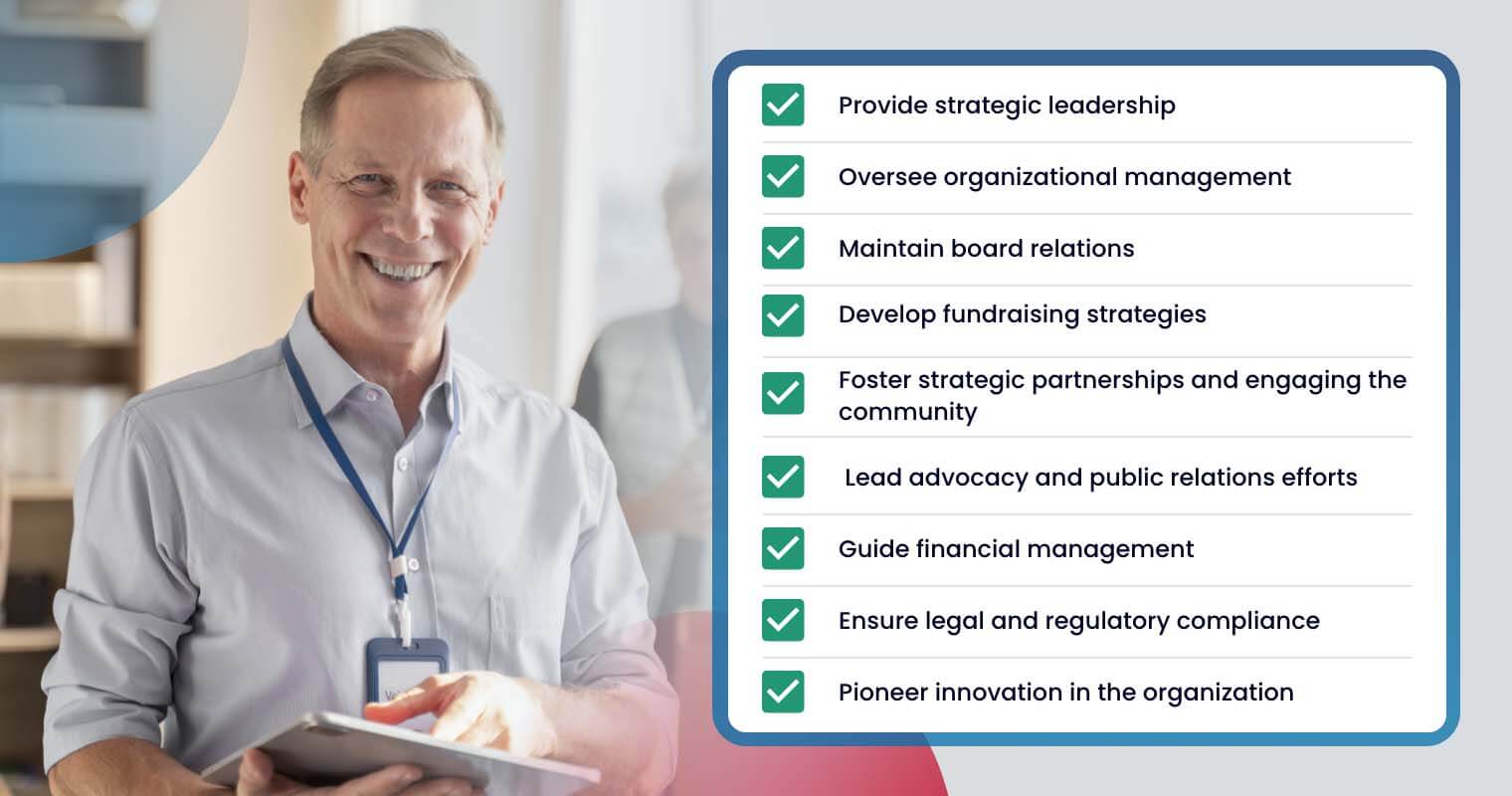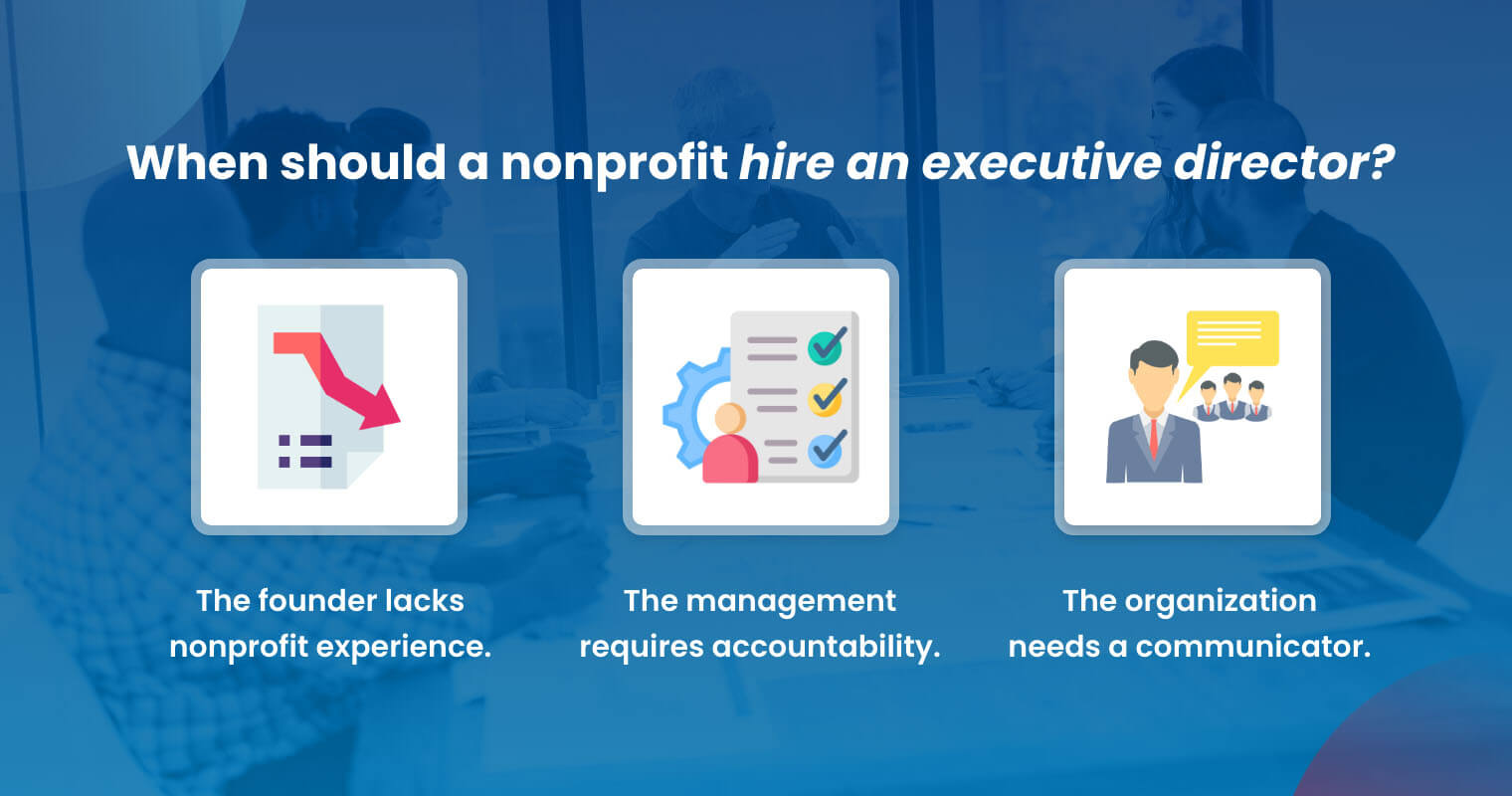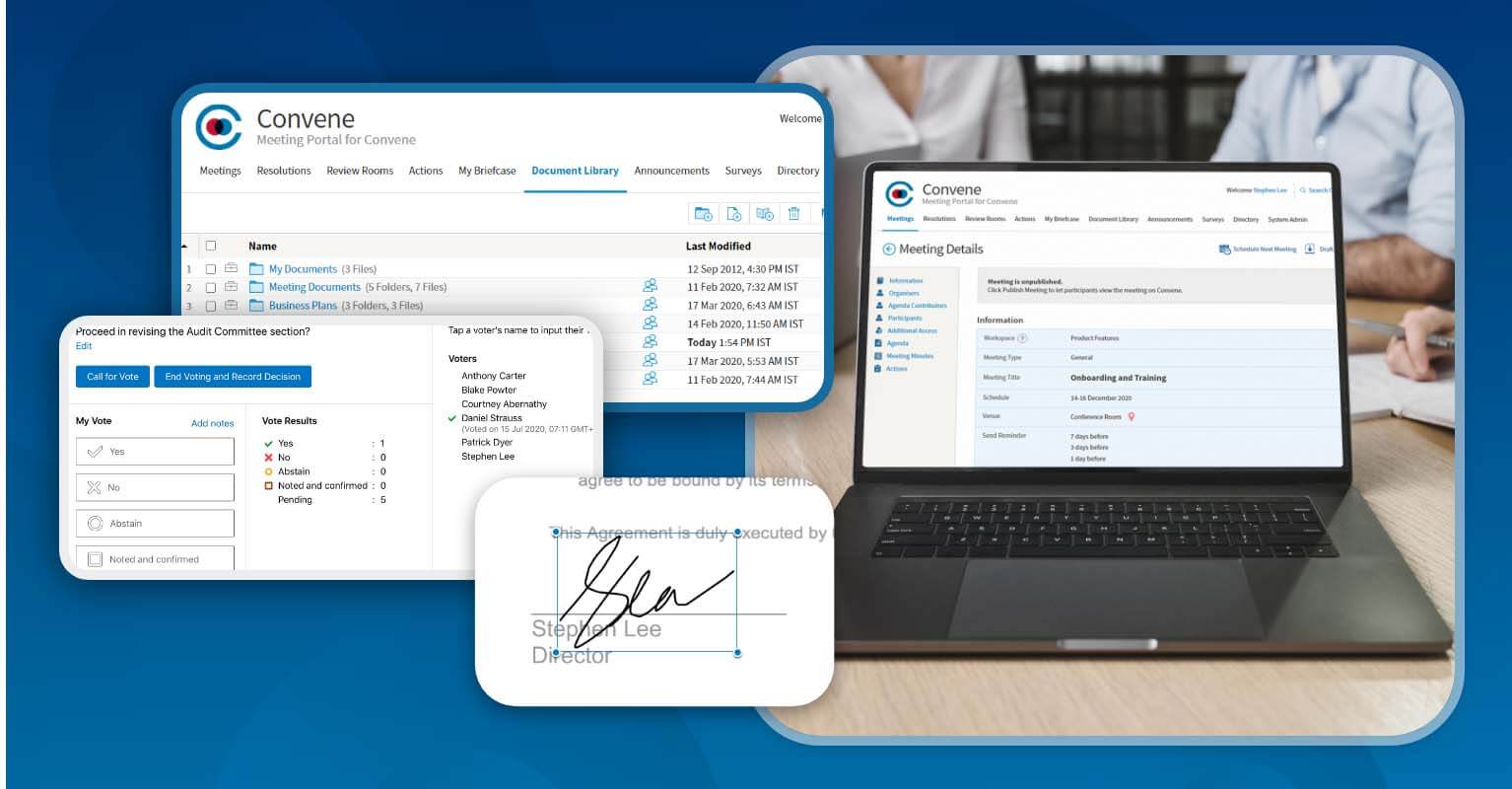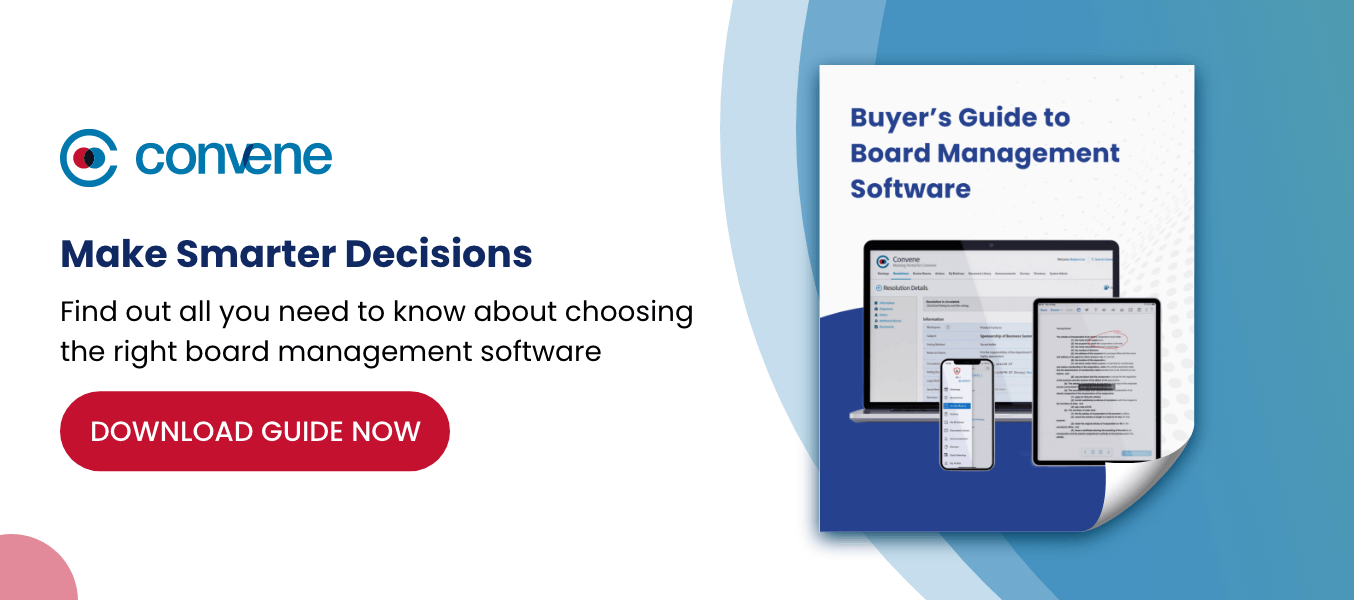What does an executive director do? In a typical organizational setting, an executive director is the key link between the board of directors and the company’s day-to-day operations. Without them guiding the organization, there would likely be a disconnect between the board’s overarching strategic goals and their practical implementation at the operational level.
But what exactly does this title entail, especially in nonprofit organizations? This article explores the role, responsibilities, qualifications, and best practices of being a nonprofit executive director.
Nonprofit Executive Director Job Description
Unlike corporate directors, who primarily focus on maximizing shareholder value, nonprofit executive directors are driven by the organization’s mission and its impact on the community it serves.
Their main goal is to advance the organization’s mission, whether providing services to those in need, advocating for social change, or promoting cultural enrichment. Nonprofit executive directors work closely with the organization’s board of directors, staff, volunteers, and stakeholders to ensure that resources are effectively allocated, programs are successful, and the organization remains financially sustainable.
While they often oversee the daily organizational management, they may share these responsibilities with a chief operating officer or senior staff members.
How are nonprofit executive directors appointed?
The process of appointing an executive director in a nonprofit involves the board selecting a candidate for the role. In some cases, the organization’s bylaws may require that a certain percentage of the membership approve the appointment. This ensures broad support for the executive director among the organization’s stakeholders.
Nonprofit Executive Director Roles and Responsibilities

So, what does a nonprofit executive director do? The duties of an executive director for a nonprofit organization span a wide range of responsibilities critical to its functioning and success. Some core duties include:
1. Provide strategic leadership
The executive director is responsible for developing and articulating the organization’s long-term vision and goals. They often work with the board of directors to create strategic plans that guide the organization’s activities and initiatives. However, smaller organizations may rely solely on the former to handle all executive-level duties, among other nonprofit executive director roles and responsibilities.
2. Oversee organizational management
As touched on previously, executive directors oversee the organization’s day-to-day operations and ensure that programs and services are delivered effectively and efficiently. This involves managing various aspects of the organization, including staffing, budgeting, and program implementation.
In their role, executive directors may need to delegate tasks to staff members to ensure that all responsibilities are carried out effectively. However, they must provide clear direction and guidance to the staff, outlining expectations and priorities to align with organizational goals.
3. Maintain board relations
Since they serve as liaisons between the board of directors and the organization’s staff, part of the nonprofit executive director job description is to provide regular updates to the board, seek input on critical decisions, and ensure that board directives are implemented effectively.
Executive directors should support all board functions, including facilitating meetings, ensuring policy compliance, and aligning the work of board committees. They also need to clarify the roles of the board, chair, and CEO.
4. Develop fundraising strategies
As the highest-ranking leaders within a nonprofit organization, executive directors are critical to spearheading fundraising efforts and nurturing relationships with donors and funders. Their role extends beyond simply overseeing these activities; they are actively involved in developing comprehensive fundraising strategies tailored to the organization’s needs and objectives.
One of the primary duties of executive directors is to personally engage with sponsors and potential donors, serving as the organization’s face during crucial negotiations. They leverage their expertise and leadership to build trust and rapport with sponsors and persuade them to invest in the organization’s mission and initiatives. This task often involves presenting compelling proposals, articulating the organization’s impact and value proposition, and addressing any concerns or inquiries from potential sponsors.
5. Foster strategic partnerships and engaging the community
Collaborating with other organizations, government agencies, and community stakeholders can significantly benefit nonprofits in several ways. Firstly, it allows them to leverage resources by pooling funds, expertise, and networks, maximizing their impact and efficiency. For instance, partnering with a government agency may provide access to additional funding or regulatory support, while collaborating with other nonprofits can lead to shared resources and knowledge exchange.
Additionally, partnerships enable nonprofits to tap into the specialized expertise of their collaborators, enriching their programs and services. One example is partnering with an organization specializing in mental health, which may enhance the quality of support services provided by a nonprofit focusing on homelessness.
The nonprofit executive director plays a crucial role in this process by identifying potential partners who align with the organization’s mission and goals. This involves researching and assessing potential collaborators and considering shared values, complementary strengths, and mutual objectives. Once suitable partners are identified, the executive director negotiates agreements that outline each party’s roles, responsibilities, and expectations.
6. Lead advocacy and public relations efforts
Nonprofit executive directors often serve as the organization’s public face, advocating for its mission and representing its interests to policymakers, the media, and the public. They may participate in advocacy campaigns, media interviews, and public speaking engagements to raise awareness of key issues and advance the organization’s goals.
7. Guide financial management
The executive director for the nonprofit works closely with the board of directors and finance committee to develop budgets, monitor expenses, and make financial decisions that support the organization’s mission. They must be aware of the regulations and requirements that apply to their organizations, such as tax returns, and report on financial matters accordingly to ensure transparency and accountability.
8. Ensure legal and regulatory compliance
Nonprofits are subject to various laws and reporting requirements – both state and federal – that govern their operations and financial practices. The executive director must ensure that the organization complies with all relevant legal and regulatory obligations, including tax laws, employment laws, and nonprofit reporting requirements.
9. Pioneer innovation in the organization
A nonprofit executive director job description encompasses even the technological aspect of the organization.
As the organization increasingly relies on technology to streamline operations and reach a broader audience, the executive director must find new ways to effectively leverage digital tools and platforms. This includes:
- Implementing board management systems for efficient board processes and centralized meetings and data-keeping
- Optimizing online fundraising strategies
- Establishing robust cybersecurity measures to protect sensitive information
- Ensuring that updates and upgrades are followed to maintain technological infrastructure and keep systems running smoothly and securely.
Fostering a culture of digital literacy would also benefit the organization, encouraging continuous learning and adaptation to technological advancements. The executive director should spearhead this initiative by holding workshops and training sessions.
When should a nonprofit hire an executive director?

When a nonprofit experiences growth and complexity, appointing an executive director to provide strategic leadership and operational oversight may become necessary. This need typically arises when the organization expands its programs or services or the board requires additional support. If you’re still undecided about whether or not to hire one, here are three common signs that indicate the need for an executive director:
1. The founder lacks nonprofit experience.
Suppose the founder lacks experience running a nonprofit or expertise in fundraising, board governance, or program management. In that case, it may be beneficial to bring in an executive director with the necessary skills and experience to lead the organization effectively. An executive director with a background in nonprofit management can provide valuable insight, guidance, and expertise to run the nonprofit organization effectively.
2. The management requires accountability.
As a nonprofit expands its operations, it may require more structured management to ensure it follows the rules, uses resources wisely, and stays accountable. An executive director can provide this support by establishing clear policies and procedures and implementing systems for monitoring the organization’s effectiveness and sustainability. Additionally, having an executive director in place can instill confidence among stakeholders, demonstrating the organization’s commitment to responsible governance.
3. The organization needs a communicator.
There can only be a handful of tasks that can be done behind the scenes, and most nonprofit engagements require in-person communication. A skilled executive director can serve as the organization’s spokesperson, advocate, and relationship-builder, effectively conveying its mission to diverse audiences. They can also encourage openness and teamwork within the organization.
How to Become a Nonprofit Executive Director
Becoming an effective executive director requires a diverse skill set and a mix of qualifications and experiences. Here are some essential executive director skills and requirements you need to know:
Visionary leadership
To be an effective leader, you must inspire others with transformative but practical ideas and show them where they want to go. It’s about being honest and setting a clear path for everyone to follow. By instilling confidence and motivation in their team, they propel the organization forward with purpose and direction.
Educational background
While specific educational prerequisites may vary, executive directors often possess advanced degrees in relevant fields such as nonprofit management, business administration, or public administration. These academic credentials provide a solid foundation in leadership theory, organizational management, financial expertise, and strategic planning. However, practical experience and continuous professional development are equally important.
Industry experience
Working in nonprofits is invaluable for executive directors; the longer their involvement, the better. Knowing how things work in this sector helps leaders handle the challenges and opportunities. Whether you’ve been involved in fundraising, managing programs, advocating for causes, or working with volunteers, it gives you a deep understanding of what’s needed. This experience helps executive directors understand what stakeholders want, what rules they need to follow, and how to improve things.
Best Practices of an Effective Nonprofit Executive Director

To excel as an executive director for your nonprofit organization, adopting best practices that promote effectiveness and success is crucial. Below are some of them:
Strategic thinking
A successful executive director is a strategic thinker. This means proactively planning for the organization’s future and making decisions based on a deep understanding of its goals and the changing external landscape. It involves not only setting long-term objectives but also staying flexible and responsive to shifts in circumstances.
Adaptive decision-making
You’ll face many tough decisions along the way. An excellent nonprofit executive director must be able to make well-informed decisions quickly, even in the face of complexity. Adaptive decision-making involves considering diverse perspectives, weighing risks and benefits, and embracing flexibility to adjust strategies as circumstances evolve. This agility enables organizations to remain resilient and responsive no matter the changes.
Effective and transparent communication
Communication lies at the heart of effective leadership. Nonprofit executive directors should cultivate a culture of open communication, both internally among staff and volunteers and externally with stakeholders and the broader community. This also includes excelling in active listening, articulate public speaking, and precise written correspondence. They must also be able to explain things clearly to their team, stakeholders, and anyone involved in their organization’s work.
Continuous learning
The nonprofit sector constantly evolves, and good executive directors recognize the importance of staying informed and up-to-date. To ensure they remain equipped to lead, they should keep abreast of emerging trends, best practices, and innovations through ongoing education and professional development initiatives.
Leverage Board Portals for Effective Executive Directorship in Nonprofit

Being a nonprofit executive director means meeting with people from within the organization or external stakeholders. These meetings are usually conducted online to accommodate diverse schedules and locations. Utilizing technology such as board portals streamlines these interactions, offering a centralized platform for seamless communication and collaboration.
Convene, a leading board meeting software, serves as an invaluable tool for executive directors, allowing them to conduct meetings efficiently online, review documents, gather votes, and facilitate decision-making processes regardless of participants’ locations. With Convene’s comprehensive, collaborative tools like live meeting annotations and screen synchronization, the board can enhance engagement and ensure everyone is on the same page during discussions and presentations.
Additionally, Convene prioritizes security by allowing only authorized personnel to access meeting files via role-based permission settings. This, combined with the app’s robust encryption, ensures that confidential information remains protected at all times.
Talk to us to discover how you can leverage Convene to power your nonprofit goals.
Jess is a Content Marketing Writer at Convene who commits herself to creating relevant, easy-to-digest, and SEO-friendly content. Before writing articles on governance and board management, she worked as a creative copywriter for a paint company, where she developed a keen eye for detail and a passion for making complex information accessible and enjoyable for readers. In her free time, she’s absorbed in the most random things. Her recent obsession is watching gardening videos for hours and dreaming of someday having her own kitchen garden.











